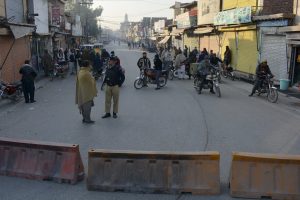Several Pakistani Taliban detainees have managed to overpower their guards at a counter-terrorism center in northwestern Pakistan, snatching police weapons and taking control of the facility, officials said Monday.
The militants at the detention center in Bannu, a district in the Khyber Pakhtunkhwa province and part of a former tribal region, also took police and others inside the compound hostage, according to Mohammad Ali Saif, a spokesman for the provincial government.
Officials say at least 30 Taliban fighters are involved in the takeover and that there could be as many as 10 hostages being held.
The brazen action reflected the Pakistani government’s inability to exercise control at all times over the remote region along the border with Afghanistan. The Pakistani Taliban are a separate group but also allied with the Afghan Taliban, who seized power in the neighboring country last year, as U.S. and NATO troops were in the final stages of their pullout from Afghanistan.
Few other details have emerged about the incident, which started late on Sunday — apparently while police were interrogating the Taliban detainees, according to Saif.
By Monday morning, Pakistan had dispatched military troops and special police forces to the area as security officials were trying to negotiate with the hostage-takers. Saif said the place was surrounded and that an operation was underway. He did not elaborate.
Authorities were still in talks with the hostage-takers, enlisting the help of several relatives of the Taliban insurgents, security officials told The Associated Press. They spoke on condition of anonymity because they were not authorized to talk to reporters.
The officials said some soldiers were also among the hostages. There were concerns that the military could storm the facility if negotiations fail. In a video message circulating on social media, the hostage-takers threatened to kill the officers if their safe passage was not quickly arranged by the government.
Mohammad Khurasani, a spokesman for the Pakistani Taliban — also known as Tehreek-e-Taliban Pakistan or TTP — confirmed the incident. He said some of the hostage-takers were members of the Pakistani Taliban who had been detained for years. Khurasani said the TTP fighters were demanding safe passage to North or South Waziristan.
Those areas were a Taliban stronghold until a wave of military offensives over the past years declared the region cleared of insurgents. Since then, TTP’s top leaders and fighters have been hiding in neighboring Afghanistan though the militants still have relatively free reign in patches of the province.
Earlier, in a video message, the hostage-takers had demanded they be airlifted to Afghanistan but Khurasani said that demand had been made by mistake, since their fighters were not aware — due to their prolonged detention — that TTP now “enjoys control in some” parts of Khyber Pakhtunkhwa, near the Afghan border.
The Pakistani Taliban have stepped up attacks on security forces since last month, when they unilaterally ended a monthslong cease-fire with the Pakistani government. The violence has strained relations between Pakistan and Afghanistan’s Taliban rulers, who had brokered the cease-fire in May.
The TTP has waged an insurgency in Pakistan over the past 15 years, fighting for stricter enforcement of Islamic laws in the country, the release of their members who are in government custody and a reduction of Pakistani military presence in the country’s former tribal regions.

































